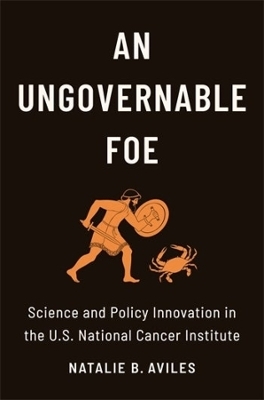
An Ungovernable Foe
Science and Policy Innovation in the U.S. National Cancer Institute
Seiten
2024
Columbia University Press (Verlag)
978-0-231-19669-7 (ISBN)
Columbia University Press (Verlag)
978-0-231-19669-7 (ISBN)
Natalie B. Aviles examines seventy years of federally funded scientific breakthroughs in the laboratories of the U.S. National Cancer Institute to shed new light on how bureaucratic organizations nurture innovation.
In American politics, medical innovation is often considered the domain of the private sector. Yet some of the most significant scientific and health breakthroughs of the past century have emerged from government research institutes. The U.S. National Cancer Institute (NCI) is tasked with both understanding and eradicating cancer—and its researchers have developed a surprising expertise in virus research and vaccine development.
An Ungovernable Foe examines seventy years of federally funded scientific breakthroughs in the laboratories of the NCI to shed new light on how bureaucratic organizations nurture innovation. Natalie B. Aviles analyzes research and policy efforts around the search for a viral cause of leukemia in the 1960s, the discovery of HIV and the development of AIDS drugs in the 1980s, and the invention of the HPV vaccine in the 1990s. She argues that the NCI transformed generations of researchers into innovative public servants who have learned to balance their scientific and bureaucratic missions. These “scientist-bureaucrats” are simultaneously committed to conducting cutting-edge research and stewarding the nation’s investment in cancer research, and as a result they have developed an unparalleled expertise. Aviles demonstrates how the interplay of science, politics, and administration shaped the NCI into a mission-oriented agency that enabled significant breakthroughs in cancer research—and in the process, she shows how organizational cultures indelibly stamp scientific work.
In American politics, medical innovation is often considered the domain of the private sector. Yet some of the most significant scientific and health breakthroughs of the past century have emerged from government research institutes. The U.S. National Cancer Institute (NCI) is tasked with both understanding and eradicating cancer—and its researchers have developed a surprising expertise in virus research and vaccine development.
An Ungovernable Foe examines seventy years of federally funded scientific breakthroughs in the laboratories of the NCI to shed new light on how bureaucratic organizations nurture innovation. Natalie B. Aviles analyzes research and policy efforts around the search for a viral cause of leukemia in the 1960s, the discovery of HIV and the development of AIDS drugs in the 1980s, and the invention of the HPV vaccine in the 1990s. She argues that the NCI transformed generations of researchers into innovative public servants who have learned to balance their scientific and bureaucratic missions. These “scientist-bureaucrats” are simultaneously committed to conducting cutting-edge research and stewarding the nation’s investment in cancer research, and as a result they have developed an unparalleled expertise. Aviles demonstrates how the interplay of science, politics, and administration shaped the NCI into a mission-oriented agency that enabled significant breakthroughs in cancer research—and in the process, she shows how organizational cultures indelibly stamp scientific work.
Natalie B. Aviles is an assistant professor of sociology at the University of Virginia.
Acknowledgments
Introduction
1. Medicine, Meliorism, and the Making of a Modern NCI
2. Cancer Viruses and the Promise of a Vaccine, 1958–1968
3. Moving Targets in the War on Cancer, 1969–1979
4. Back to Basics: Human Cancer Retrovirus Research, 1980–1984
5. HIV Research and Drug Development, 1985–1989
6. Lost in Translation, 1990–2001
7. From Roadmap to Moonshot, 2002–2016
Conclusion
Methodological Appendix
Notes
Bibliography
Index
| Erscheinungsdatum | 28.11.2023 |
|---|---|
| Zusatzinfo | 11 b&w illustrations |
| Verlagsort | New York |
| Sprache | englisch |
| Maße | 156 x 235 mm |
| Themenwelt | Studium ► Querschnittsbereiche ► Prävention / Gesundheitsförderung |
| Sozialwissenschaften ► Politik / Verwaltung ► Staat / Verwaltung | |
| Sozialwissenschaften ► Soziologie | |
| ISBN-10 | 0-231-19669-5 / 0231196695 |
| ISBN-13 | 978-0-231-19669-7 / 9780231196697 |
| Zustand | Neuware |
| Informationen gemäß Produktsicherheitsverordnung (GPSR) | |
| Haben Sie eine Frage zum Produkt? |
Mehr entdecken
aus dem Bereich
aus dem Bereich
das Manual zur psychologischen Gesundheitsförderung
Buch | Hardcover (2023)
Springer Berlin (Verlag)
39,99 €
Wissenschaftlich basierte Empfehlungen, Tipps und Ernährungspläne für …
Buch (2022)
Thieme (Verlag)
51,00 €


